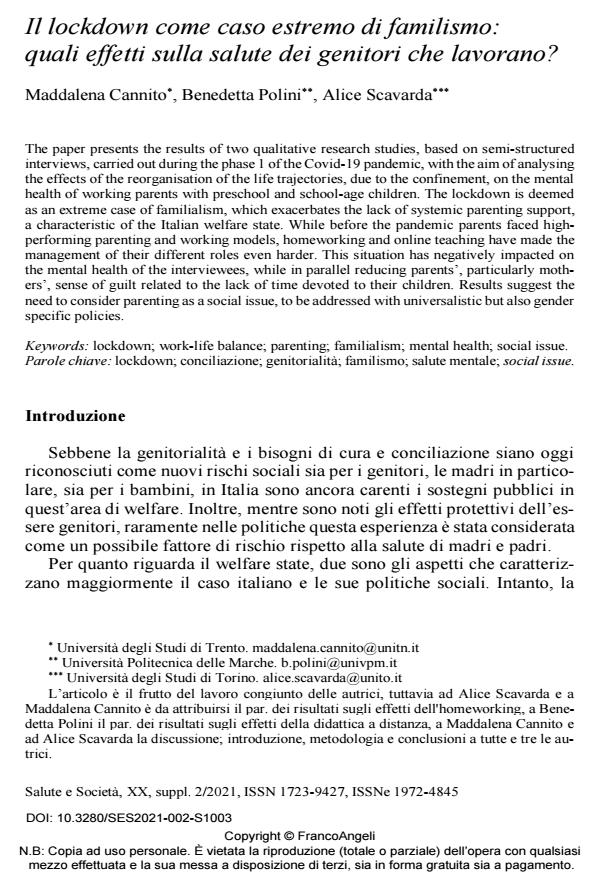Il lockdown come caso estremo di familismo: quali effetti sulla salute dei genitori che lavorano?
Journal title SALUTE E SOCIETÀ
Author/s Maddalena Cannito, Benedetta Polini, Alice Scavarda
Publishing Year 2021 Issue 2021/suppl. 2 Language Italian
Pages 17 P. 35-51 File size 732 KB
DOI 10.3280/SES2021-002-S1003
DOI is like a bar code for intellectual property: to have more infomation
click here
Below, you can see the article first page
If you want to buy this article in PDF format, you can do it, following the instructions to buy download credits

FrancoAngeli is member of Publishers International Linking Association, Inc (PILA), a not-for-profit association which run the CrossRef service enabling links to and from online scholarly content.
The paper presents the results of two qualitative research studies, based on semi-structured interviews, carried out during the phase 1 of the Covid-19 pandemic, with the aim of analysing the effects of the reorganisation of the life trajectories, due to the confinement, on the mental health of working parents with preschool and school-age children. The lockdown is deemed as an extreme case of familialism, which exacerbates the lack of systemic parenting support, a characteristic of the Italian welfare state. While before the pandemic parents faced highperforming parenting and working models, homeworking and online teaching have made the management of their different roles even harder. This situation has negatively impacted on the mental health of the interviewees, while in parallel reducing parents’, particularly mothers’, sense of guilt related to the lack of time devoted to their children. Results suggest the need to consider parenting as a social issue, to be addressed with universalistic but also gender specific policies.
Keywords: lockdown; work-life balance; parenting; familialism; mental health; social issue.
- Baumeister R.F. (1991). Meanings of life. New York: Guilford.
- Cannito M., Scavarda A. (2020). Childcare and Remote Work during the COVID-19 Pandemic. Ideal Worker Model, Parenthood and Gender Inequalities in Italy. Italian Sociological Review, 10 (3S): 801-820.
- Clarke E., Dumas A. (2020). Children’s active outdoor play: “good” mothering and the organisation of children’s free time. Sociology of Health & Illness, 42 6:1229–1242. DOI: 10.1111/1467-9566.1310
- Di Nicola P., Ruspini E. (2020). Family and Family Relations at the Time of COVID-19: An Introduction. Italian Sociological Review, 10 (3S), 679-685.
- Doepke M., Zilibotti F. (2019). Love, Money & Parenting. How Economics Explains the Way We Raise Our Kids. Princeton: Princeton University Press.
- Dotti Sani GM., Treas J. (2016). Educational gradients in parents’ child-care time across countries, 1965-2012. Journal of Marriage & Family, April Faircloth C. (2013). Militant Lactivism?. New York, Oxford: Berghahn.
- Furedi F. (2002). Paranoid parenting: Why ignoring the experts may be the best for your children. Chicago: Chicago Press.
- King N. (1998). Template analysis. In: G. Symon & C. Cassell (Eds.), Qualitative methods and analysis in organizational research: A practical guide, London: Sage.
- Lee E., Bristow J., Faircloth C., Macvarish J., a cura di (2014). Parenting Cultural Studies. UK: Palgrave Macmillan.
- Lunau T., Bambra C., Eikemo T.A., van Der Wel K.A., Dragano N. (2014). A Balancing Act? Work–Life Balance, Health and Well-Being in European Welfare States. The European Journal of Public Health, 24(3): 422-427.
- Mennino S.F., Rubin B.A., Brayfield A. (2005). Home-To-Job and Job-To-Home Spillover: The Impact of Company Policies and Workplace Culture. The Sociological Quarterly, 46(1): 107-135.
- Moen P., Fan W., Kelly E. L. (2013). Team-level flexibility, work–home spillover, and health behavior. Social Science & Medicine, 84: 69-79. DOI: 10.1016/j.socscimed.2013.02.011
- Naldini M., a cura di (2016). La transizione alla genitorialità. Da coppie moderne a famiglie tradizionali. Bologna: Il Mulino. Polini B. (2020). “IV piano nazionale di azioni e di interventi per la tutela dei diritti e lo sviluppo dei soggetti in età evolutiva”. Alcune osservazioni sulla strategia del sostegno alla genitorialità. la Rivista delle Politiche Sociali, 1: 177-189. DOI: 10.1423/9693
- Polini B., Maggioni G. (2016). La genitorialità adeguata. Competenza ed efficacia nelle relazioni famigliari. Milano: Franco Angeli.
- Rizzo K.M., Schiffrin H.H., Liss M. (2013). Insight into the Parenthood Paradox: Mental Health Outcomes of Intensive Mothering. Journal of Child and Family Studies, 22(5): 614-620.
- Rogers A., Pilgrim D. (2014). A sociology of mental health and illness. Berkshire: Open University Press.
- Ruppanner L., Perales F., Baxter J. (2019). Harried and Unhealthy? Parenthood, Time Pressure, and Mental Health. Journal of Marriage and Family, 81(2): 308-326.
- Saraceno C. (2016). Mamme e papà. Gli esami non finiscono mai. Milano: Feltrinelli.
- Saraceno C., Keck W. (2011). Towards an Integrated Approach for the Analysis of Gender Equity in Policies Supporting Paid Work and Care Responsibilities. Demographic Research, 25(11): 371-406.
- Satta C. (2020). Una nuova centralità? La famiglia al tempo della pandemia tra ordinarietà e straordinarietà. Sociologia italiana, 16: 165-184 DOI: 10.1485/2281-2652-202016-1
- Shirani F., Henwood K., Coltart C. (2012). Meeting the Challenges of Intensive Parenting Culture: Gender, Risk Management and the Moral Parent. Sociology, 46(1): 25-40. DOI: 10.1177/003803851141616
- Simon R.W. (2018). Parenthood and Mental Health in the United States: Why Don’t Children Improve Adults’ Emotional Well-Being?. In: Janning M.Y., a cura di, Contemporary Parenting and Parenthood: From News Headlines to New Research. Santa Barbara, California: Praeger.
- Sutherland J. (2010). Mothering, Guilt and Shame. Sociology Compass, 4: 310-321.
- Introduzione Silvana Salerno, Valeria Quaglia, in WELFARE E ERGONOMIA 1/2022 pp.31
DOI: 10.3280/WE2022-001004 - Protective and risk factors for social withdrawal in adolescence. A mixed-method study of Italian students’ wellbeing Franca Beccaria, Alice Scavarda, Antonella Roggero, Emanuela Rabaglietti, in Modern Italy /2022 pp.259
DOI: 10.1017/mit.2022.10
Maddalena Cannito, Benedetta Polini, Alice Scavarda, Il lockdown come caso estremo di familismo: quali effetti sulla salute dei genitori che lavorano? in "SALUTE E SOCIETÀ" suppl. 2/2021, pp 35-51, DOI: 10.3280/SES2021-002-S1003